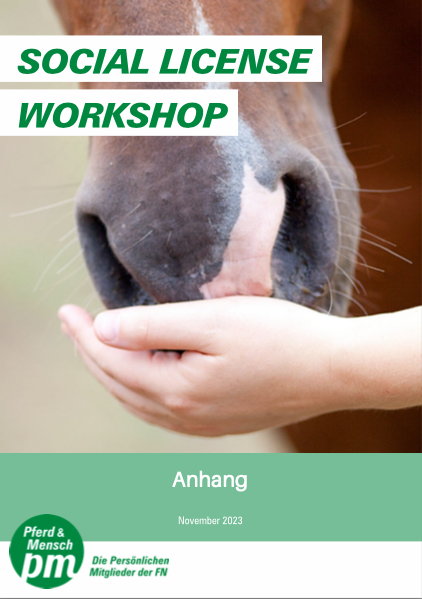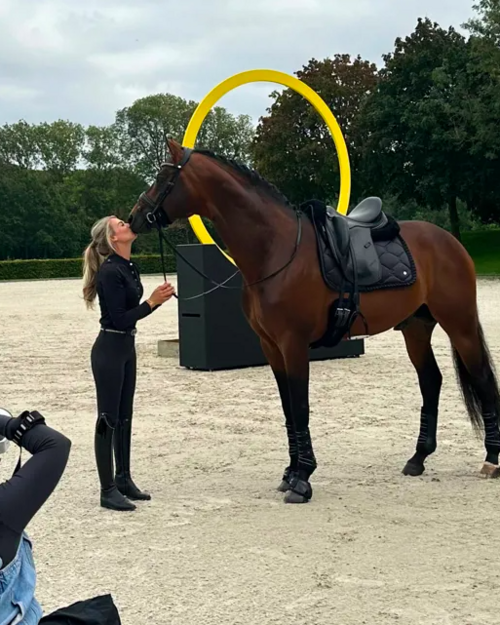Social Licence: European National Federations in Action
30. Jan 2024 / Category: News
The issue of social licence has been frequently discussed in recent years, as the power of public perception to influence the governance and overall success of sport has become clear.
Initial studies have shown the public has concerns about horse welfare and the overall role of the horse in a sport context. The emphasis is therefore now on us, to change these opinions, consider how we approach our sport and educate the public to develop a stronger reputation for equestrianism to ensure we maintain the social licence to operate.
The real question therefore becomes how. The breadth of people involved, who have formed opinions from a range of experiences, from those competing or spectating top sport, to those taking their children for a weekly lesson, is vast. Finding the right ways to connect to these different groups, and tackling the issues they foresee is part of the challenge. It is important therefore to consider the areas in which we have influence, to engage fully, and create changes in perception. Our National Federations have started to find ways to do just this.
In Germany, the Federation Deutsche Reiterliche Vereinigung (FN) has built a complete strategy to tackle the issue. In 2022, a workshop took place with representatives from different areas of equestrian sport to consider: “What can we do to secure the social license“. EEF President Theo Ploegmakers was one of the keynote speakers at this workshop. From this workshop, the FN developed a strategy that is intended to regain society's trust and secure it in the long term. The strategy is initially scheduled to run until 2026 and will be constantly adapted and developed.
It consists of six areas of action:
· Raising awareness: The goals of this area of action are to promote a common understanding of values, cohesion in the horse world and awareness of necessary changes. The FN is planning, among other things, a hundred workshops on the topic of social licensing throughoutGermany.
· Access to the sport: in which FN will be supporting riding clubs to source and fund suitable horses to particularly for children to engage and learn.
· Rules and governance: working to ensure frameworks are in place to ensure fair sport with the horse as an equal partner, to explain and implement the rules even better.
· Science: growing knowledge and studying thehorse to inform decision-making and maintain the best conditions for horses
· Top sport: combining performance and welfare with transparency and open access.
· Communication: connecting athletes and those both inside and outside the sport to understand the importance of horses in society.
In the Netherlands, the need for action is also clearly understood. The Dutch Federation (KNHS) has been building tools into their strategy, alongside looking at some alternative methods for increasing the. awareness and positive visibility of horses for the mainstream public. Working directly with the production company ITV, they found an opportunity to place an equine segment into one of the most popular Dutch TV programmes “Het Perfecte Plaatje”, a photography competition programme. Featuring a number of top athletes and their horses, the segment challenged photographers to capture “the loving bond between horse and rider with an Olympic ring in images”. Each episode has an estimated 2million viewers, providing a unique opportunity to bring equestrian sport to the forefront of people’s minds in an entirely new way.
Communications and marketing manager from KNHS, Esther Hendriksen told us “At the KNHS we are continuously looking at how we can positively influence the Dutch public in their view of equestrian sports. We are all a little concerned about how our sport is viewed. Research shows that a very small part of the Netherlands is really negative about equestrian sports, a large part of the Netherlands is positive. An equally large proportion have no opinion about equestrian sports. And there lies an opportunity. With such a great program like this, we reach an audience of millions in one go and we can positively influence the opinion of many people who have a neutral view of equestrian sports. Naturally, we are also already thinking about the media strategy for 2024, to ensure that a large audience continues to have a positive image of equestrian sports.”
These techniques show strong promise and echo the findings and experience of other non-equine sectors that have had the same requirement.
World Horse Welfare held an insightful conference (available to rewatch here) last week, looking at the practical strategies non-equine industries have used to tackle the issue of social licence. “Openness, collaboration and action” were the key pillars for McDonalds, who did a huge amount of work across waste management, animal rights and welfare, and the health credentials and obesity links surrounding the company. Ex-VP (Corporate Social Responsibility &Sustainability at McDonald’s) Bob Langert explained the importance of acting early before the curve of potential concern becomes founded negativity. He noted that Mcdonalds’ found particular success when working with legitimate third-party groups who could verify the changes and practices McDonald’s carried out were genuine and of a publicly approved standard, and the potential for sport to do the same to tackle particular issues.
Overall, the pathway to actioning social licence issues is complex. It requires action, on horse welfare, environmental sustainability and the issues within our sport that the public is critical of. It also requires communication of the work that is happening in these areas, to show the public we hear their concerns and are truly engaged in the issues. There is also a need for research, to both quantify and substantiate any changes that are made, whether this is horse welfare or environment. And it is a continuous process. There must be continuous active listening, to monitor the opinions and acceptance society has. There must be continuous development within the sport so we adjust and change with an evidence-based approach to the issues. And there must be continuous communication, in an open dialogue to build and maintain trust.
The time for action is now, and the tools and strategies to create change and build our social licence to operate are available for us to start using




